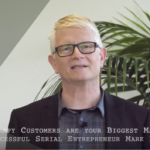Three friends fizzing
Adam Sorensen, Scott Day and Russell Hopper are succeeding fast in New Zealand’s highly competitive beverages market with their small, but perfectly formed, range of sugar-free carbonated drinks. And they have major ambitions.
Adam Sorensen, Scott Day and Russell Hopper are succeeding fast in New Zealand’s highly competitive beverages market with their small, but perfectly formed, range of sugar-free carbonated drinks. And they have major ambitions.
This business story has its origins within the schoolyard – namely Kristin School on Auckland’s North Shore.
Ex-pupils Adam Sorensen, Scott Day and Russell Hopper, the co-founders of Vista Drinks, have been best mates for many years – all sharing a common love for rugby.
Adam and Russell knew each other from age five, when they first started at Kristin. Scott came along in Form 1. By the time all three passed their driving licences as teenagers they were well versed in the art of “harmless mischief”, as Adam puts it.
The food and beverage (F&B) market was probably the furthest thing from their minds when the trio embarked on their separate careers.
“Basically from quite a young age we were all pretty adamant that we weren’t going to be ‘working for the man’ for very long,” Adam remembers. “We hadn’t always planned to do something together, but just all knew we wanted to be building something up ourselves.
“So we explored our interests, getting our feet wet and working around the world in our respective industries, but constantly thinking of ways to not have to work for someone else.”
When they first started developing Vista Drinks in May 2016, Adam was a sports marketer in London, Scott was based in Fort Lauderdale as a chief engineer on super-yachts, and Russell was employed as a yacht broker in Auckland.
The idea for their no-sugar carbonated drinks came from a shared dislike of sugary fizzy drinks and juice and seeing nothing in supermarket drinks aisles that could satisfy their thirst.
With research telling them that Kiwis are becoming increasingly averse to sugary drinks, what started out as a discussion quickly turned into a serious idea.
Despite a complete lack of experience in the FMCG space they decided to “give it a nudge” and enter the ‘Lion’s Den’.
“The fact that we’d finally figured out our major play to take a gamble on provided us with enough motivation to start investing serious time and money into the project,” says Adam.
The early days of the business were rather unconventional for an early-stage start-up. Progress was slow in the first year owing to the fact that they were spread out across the globe.
By the time Adam and Scott moved back to New Zealand in October 2017, the brand had been developed, factory leased and conversations had with the supermarkets – all the result of many late night conference calls, multiple long-haul flights, and the efforts of Scott’s sister-in-law on the ground here in New Zealand.
Finding stockists seemed relatively easy to begin with, although the competition didn’t play fair by supplying fridges with their product, says Adam. There was also difficulty in initial marketing of the drink to generate sales volume with so few Countdown supermarkets stocking the brand.
“We were able to combat this to an extent through [comprehensive] geo-marketing around [individual] stores. But unfortunately you still get people interested [in the product] who couldn’t find it at their local, which can lead to a bit of frustration towards the brand.”
The biggest challenge, he explains, is having tens of thousands of cans manufactured and waiting until stockists such as supermarkets and gas stations are ready to take it on.
Encouraging category managers to review their product lines is simply a waiting game.
Right now they’re positioning themselves for a good crack at summer 2019. Vista’s sales and marketing team aims to be in 80 percent of New World, Pak ‘n Save and Four Square stores by the end of the year.
It’s a highly competitive market, but the guys are thriving on it and the positive feedback from social media and in-store sampling sessions tells them they have the right product.
Business lessons
The key lesson for the three founders of Vista has been to keep everything in house for as long as possible, before engaging contractors.
“While something may be daunting at first because you have zero experience, there is only one way you can gain it,” Adam explains. “By making yourself knowledgeable you’ll save your business a lot of money in the short run; and when you’re big enough to contract out, you can easily spot if someone’s taking you for a ride.”
After initially burning precious funds, they are grateful for the help from food techs in developing the final product and connecting them with the right industry people – which all helped get their pilot run underway.
The speed at which Progressive and Foodstuffs took on their product was unexpected, but appreciated – and vital for building sales volume.
And yes, all three sets of parents chipped in with valuable advice along the journey.
Although small by world standards, New Zealand’s F&B market is still an incredibly busy one, says Adam, and you need to make the right contacts.
“Even though major players dominate most categories, if there is product/market fit for your offering, there lies an opportunity.”
A fizzing future
Adam, Scott and Russell agree that they are very different people when it comes to doing business and their approach to it.
“If we had to put labels on it, Russell is quite conservative, Scott can be impetuous and I’m more or less in the middle and can go either way on things,” explains Adam.
But all those years as friends means they understand each other well when it comes to issues or opportunities – and their long term business goals are completely aligned.
“Having invested all that time, money and energy, we don’t see [Vista] being anything but successful and are determined to grow and gain market share,” says Adam.
While the BHAG is to be in every major market – particularly Asia and the US – the co-founders are targeting Australia, with its large market and warmer year-round climate as the initial export destination. That’s after they’ve got the domestic market properly sorted.
However, taking freight costs into account, tackling Australia will probably involve another production facility across the Tasman.
Meanwhile, to maintain growth momentum in this country, Adam says they’re also exploring new sales channels.
“An interesting one is offering a subscription-type service to businesses that supply their staff with drinks; whether it be for Friday night drinks or to keep the fridge stocked.”
It’s this sort of thinking ‘outside the box’ that will see Vista become a successful leader in its category. Just watch that space.


